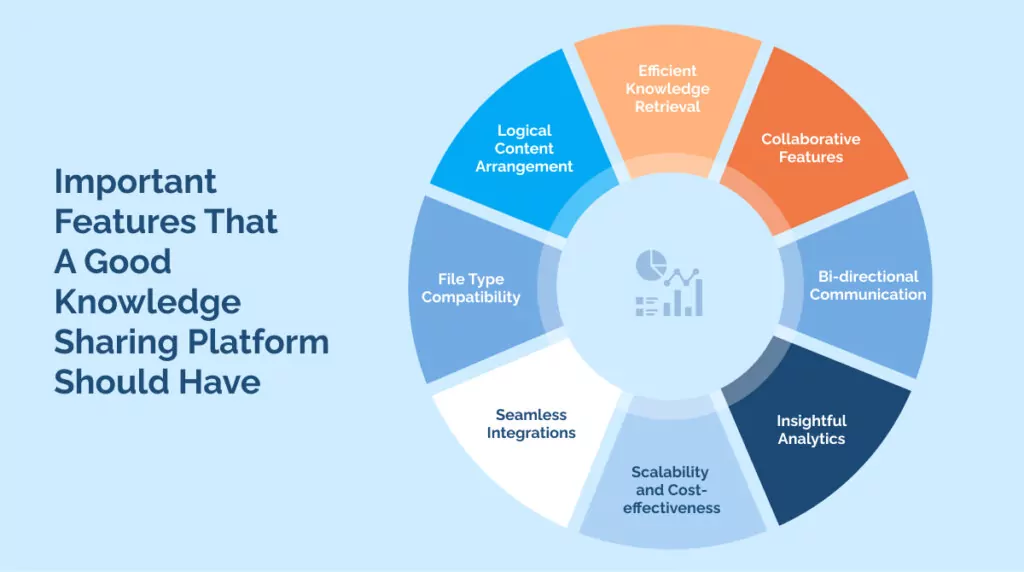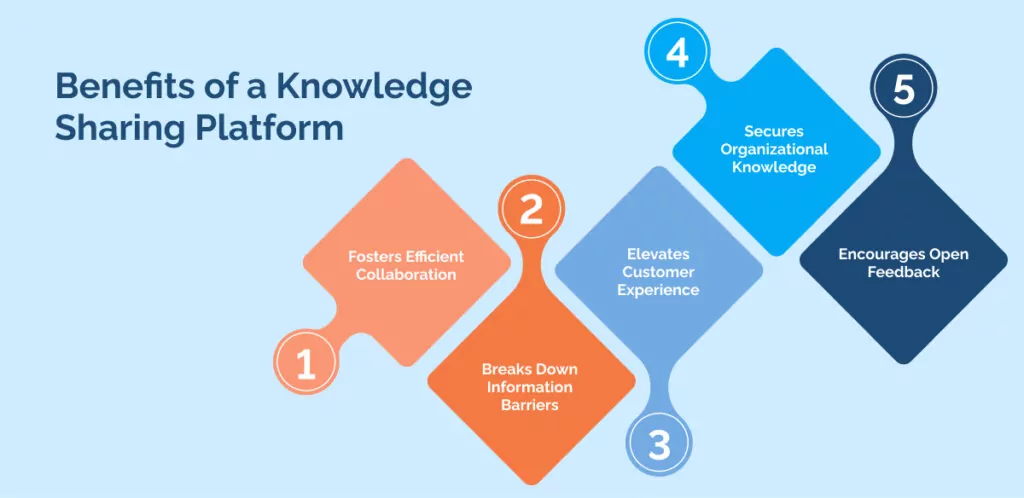
A knowledge sharing tool is software or an application that facilitates the dissemination of information and insights within a team.
Picture it as a digital resource that archives and structures collective wisdom, making it accessible to current team members and invaluable for integrating recruits.
These tools can range from wiki-style platforms to comprehensive project management systems. Their primary goal is to enhance collaboration, communication, and continuous employee learning. It’s common for employees to spend significant work time seeking answers to queries.
Though supportive managers are always willing to assist, addressing the same queries from employees repeatedly can be taxing.
Being continuously interrupted to answer questions can hinder productivity and focus. For the inquiring employees, awaiting responses, especially if the expert is unavailable, can be equally distressing.
A knowledge-sharing tool provides a remedy to this issue, minimizing redundant questions by offering immediate access to the required information.
By the end of this article, you will understand:
- What a knowledge sharing platform is
- The most important features of a knowledge sharing platform
- The benefits of a knowledge sharing platform
- The main differences between a knowledge sharing platform and a knowledge base
- The 11 best knowledge sharing platform tools
- How a digital adoption platform can help your employees get to grips with a knowledge sharing platform
What Is A Knowledge Sharing Platform?
A knowledge sharing platform, often called an internal wiki or intranet portal, serves as a learning & development instrument. It’s a central repository for disseminating information, guidelines, policies, protocols, etc.
Its main aim is to boost learning, streamline problem-solving, and facilitate informed data-driven decision-making by making pertinent information accessible to those in need.
Your business can use a knowledge sharing platform to onboard new employees into an organization, document essential procedures and processes, store relevant HR rules and handbooks, release critical announcements, or hold vital product or software guides.
Using such a platform streamlines the search for crucial data for employees. This not only enhances team efficiency but also fosters a culture of knowledge dissemination within the organization.
Important Features That A Good Knowledge Sharing Platform Should Have

Considering a knowledge-sharing platform for your organization? It’s crucial to ensure it boasts the features essential to integrate into your current workflows seamlessly.
Here’s a checklist to guide your selection:
File Type Compatibility
Whether your organization thrives on spreadsheets or leans on video for internal communications, the platform must support your primary file types.
Logical Content Arrangement
A platform can be counterproductive if the content isn’t systematically organized. Ideal platforms offer personalized feeds and pages, ensuring easy access to relevant information for all users.
Efficient Knowledge Retrieval
To be truly beneficial, users should swiftly pinpoint the information they seek. Seek platforms with robust, user-friendly search capabilities. Some even allow cross-platform searches, spanning your email, Google Drive, and SharePoint. Additionally, an all-encompassing people directory can guide employees to the right colleagues for their queries.
Collaborative Features
In today’s remote work landscape, facilitating distant collaboration is paramount. Contemplate platforms that blend knowledge-sharing and teamwork to prevent overwhelming employees with multiple interfaces.
Bi-directional Communication
Knowledge exchange isn’t unilateral. To facilitate knowledge sharing and foster a sense of inclusivity, platforms should encourage contributions from all tiers of the organization.
Insightful Analytics
Understanding what content resonates is crucial. Advanced analytics can reveal the most accessed content, offering insights.
Scalability and Cost-effectiveness
Not all platforms are tailor-made for every organization size. Ensure your choice can evolve alongside your company’s aspirations. Also, the pricing structure should align with your budget and offer value for money.
Seamless Integrations
Since employees use various apps daily, your chosen tool must complement existing ones. Platforms that effortlessly integrate with widely used workplace tools like Google Workspace, Microsoft 365, and Slack are usually more desirable.
Benefits of a Knowledge Sharing Platform

When employees can’t access relevant information quickly, your company’s bottom line takes a hit. Therefore, an effective knowledge-sharing tool is not merely a luxury but an imperative.
Here are some primary advantages of introducing a knowledge-sharing platform to your business:
Fosters Efficient Collaboration
Knowledge-sharing platforms promote real-time collaboration, a cornerstone for nurturing a knowledge-centric organizational culture.
It’s vital that employees and teams can work together within a unified software setting to produce results, sidestep redundancies, and gain a comprehensive grasp of company goals.
These platforms consolidate all pertinent information, resources, and data, negating the need for fragmented and disorganized internal communication.
Breaks Down Information Barriers
Many companies grapple with the issue of data hoarding, which results in information silos. These silos manifest when data becomes isolated to particular departments, teams, or individuals, hindering communication, teamwork, and overall efficiency.
By structuring data in one accessible locale, a knowledge-sharing platform ensures all employees can tap into vital information. This eradicates information hoarding and facilitates fluid data interchange.
Elevates Customer Experience
Knowledge-sharing platforms refine the customer experience by offering a centralized reservoir of information and assistance. They provide abundant self-help tools like FAQs, how-to guides, and troubleshooting resources.
Customers can independently pinpoint solutions, reducing direct support interactions and expediting issue resolution. Plus, this data remains accessible around the clock.
Secures Organizational Knowledge
Preserving information is a pivotal attribute of knowledge-sharing platforms. All data is archived in a singular spot, streamlining access, search, and sharing capabilities.
Such platforms ensure expertise continuity, furnishing an organized repository for knowledge storage. Reusable insights can be applied across diverse projects, enhancing resource allocation and forestalling redundant tasks.
Encourages Open Feedback
An effective knowledge-sharing platform is dynamic, allowing users to offer input directly on the portal. Such immediate feedback is paramount for cultivating a knowledge-sharing ethos, aligning team objectives, and driving enduring success.
Knowledge Sharing Platform Vs Knowledge Base: What’s The Difference?
While both a knowledge base and a knowledge-sharing platform aim to distribute information, they possess distinct characteristics.
A knowledge base serves primarily as a technological means to centralize and share knowledge, comparable to a universally accessible Google Drive.
On the other hand, a knowledge-sharing platform elevates this by organizing and delivering the content in a more accessible and interactive manner.
Such platforms are equipped with features that streamline content searching and engagement.
Within a comprehensive knowledge-sharing platform, team members can view files in their authentic context, drop comments or queries for peers, and even co-edit documents, all under a single unified environment.
11 Best Knowledge Sharing Platform Tools
Selecting the right knowledge management tool can be daunting, given the myriad choices available, each boasting unique features and capabilities.
To simplify this decision, here’s an overview of eight leading knowledge-sharing platforms in 2023:
Happeo
Happeo combines knowledge-sharing, employee intranet, and a social platform into one easy-to-navigate app. Channels enable content sharing and collaboration, while dynamic intranet pages host crucial company data.
The Universal Search function, complemented by the Federated Search add-on, allows for comprehensive searching across multiple platforms.
Key Features:
- Enhances the employee experience through personalized feeds and home pages
- Channels for communication
- Advanced search capabilities
- Employee directory
- Integrations with major platforms like Google Workspace and Office 365
Google Workspace
Google Workspace provides a comprehensive suite of collaborative tools designed to streamline productivity and enable seamless teamwork.
With Gmail, Drive, Docs, and Meet at your disposal, you can easily communicate, store, create, and collaborate in real-time. Google Drive, in particular, serves as a powerful corporate knowledge repository, allowing you to securely store and access important files, documents, and resources, ensuring that valuable information is readily available to your team.
Key Features:
- Collaborative tools suite
- Advanced search
- Google Drive for document management
- Seamless inter-tool integration
Microsoft SharePoint
SharePoint is a versatile platform that revolves around traditional intranet setups. It offers extensive customization options, allowing organizations to tailor it to their specific needs.
However, due to its highly customizable nature, SharePoint does require dedicated maintenance to ensure optimal performance and seamless user experience. By regularly maintaining and updating SharePoint, businesses can continue to leverage its full potential and reap the benefits of a robust and efficient intranet solution.
Key Features:
- Code-free intranet creation
- AI-enhanced content suggestions
- Robust security measures
- Tight integration with the Microsoft ecosystem
Confluence
Confluence, an exceptional Atlassian product, is a powerful intranet and knowledge management system designed specifically for larger teams. With its extensive array of features and functionalities, Confluence empowers organizations to effortlessly collaborate, share information, and streamline knowledge sharing processes.
By providing a centralized hub for team collaboration and documentation, Confluence promotes seamless communication, enhances productivity, and enables teams to work together more efficiently toward achieving their goals.
Key Features:
- Organized content hierarchy
- Enhanced search
- Custom home pages
- Versatile integrations
Notion
While primarily recognized as a powerful project management tool, Notion goes beyond by providing a comprehensive platform for knowledge storage and seamless sharing.
Its versatile features empower teams and individuals to effortlessly organize, collaborate, and access information, fostering productivity and efficiency in a beautifully integrated workspace.
Key Features:
- Multimedia support
- Interlinking between pages
- Page-specific permissions
- Collaboration tools
Nuclino
Nuclino is not just a sleek and user-friendly platform, but it’s also a powerful tool for content creation and management. With its visual editor and intuitive interface, creating and organizing content becomes effortless.
But that’s not all – Nuclino’s rich set of features allows for seamless collaboration on projects, whether you’re working alone or as part of a team. By streamlining the content creation process, Nuclino enhances productivity and helps you stay focused on what matters most. Experience the versatility and efficiency of Nuclino and take your content creation to the next level!
Key Features:
- Real-time collaboration
- Efficient search
- Varied data views
- 40+ workplace integrations
Papyrs
Papyrs is a highly versatile platform that seamlessly combines the power of an intranet, a wiki, and a knowledge-sharing hub. With its user-friendly interface and robust features, Papyrs empowers teams to collaborate effectively, share information effortlessly, and streamline their workflows.
Whether it’s organizing company resources, documenting processes, or fostering a culture of knowledge-sharing, Papyrs is the go-to solution for modern businesses seeking a comprehensive and efficient collaboration tool.
Key Features:
- Drag-and-drop editing
- Embedded widgets
- Comprehensive search
Tettra
Tettra is a powerful knowledge storage platform that simplifies the way you organize and access information. With its seamless integration with Slack, you can easily collaborate with your team and share knowledge in real-time.
Whether it’s capturing important company insights, documenting processes, or creating a centralized repository for best practices, Tettra has got you covered. Experience the efficiency and productivity boost that comes with having all your knowledge at your fingertips.
Key Features:
- Slack Q&A feature
- User-friendly design
- Expert verification
Salesforce Knowledge
As a component of the larger Salesforce ecosystem, Salesforce Knowledge empowers organizations to accumulate, structure, and disseminate crucial information to their internal teams and clients.
The platform aids businesses in building a consolidated archive of knowledge articles, FAQs, and other documentation, simplifying the process for customer service representatives and customers to locate answers swiftly.
Key Features:
- Multilingual capabilities
- Dedicated self-service portal
- Instantaneous updates
Knowmax
Knowmax is an AI-driven platform equipped with knowledge management tools. It amplifies customer service effectiveness with decision tree analytics for phone interactions and AI chatbot dialogues.
The decision tree feature of Knowmax facilitates customer service agents to work together on customer queries and to retrieve earlier responses to frequent questions.
Key Features:
- An insightful dashboard offering a visual breakdown of incoming tickets
- User-friendly interface
- Interactive forums for real-time collaboration.
Slab
Slab presents a user-friendly knowledge-sharing platform that effortlessly synchronizes with an array of tools in a user’s existing arsenal, encompassing spreadsheets, presentations, flowcharts, and task management utilities.
Its integrated search capability ensures that pivotal data can be accessed promptly. Boasting an aesthetically pleasing design, navigating and working within Slab becomes a delightful experience.
Key Features:
- Comprehensive search capability
- Seamless integration with external tools
- Intuitive user interface.
How A DAP Can Help Your Organization Adopt A Knowledge Sharing Platform Tool
When choosing the right knowledge sharing tool or platform for an organization, decision-makers must evaluate its user-friendliness, compatibility with existing tools, and ease of long-term maintenance.
While a stylish interface or cutting-edge features might catch the eye, a knowledge-sharing platform can quickly become a financial drain and time-sink if it doesn’t resonate with the team’s practical needs and expectations.
The pivotal phase in effectively deploying a knowledge-sharing platform is ensuring your team is adeptly trained to harness its full capabilities. Digital adoption platforms can significantly streamline this onboarding process.
Such platforms furnish immersive, user-centric experiences that navigate employees through the nuances of the new tool. They deliver methodical tutorials, on-the-spot contextual assistance, and tailored guidance, enabling users to grasp the subtleties of the knowledge-sharing tools.
By demystifying intricate tasks, delivering situation-aware support, and fostering experiential learning, digital adoption platforms bolster employees’ comprehension and mastery.
This ensures swift and proficient adoption, optimizing knowledge-sharing platforms throughout the enterprise.
Select A Top Knowledge Sharing Platform To Help Your Business Thrive
A knowledge-sharing platform is a central place where employees store and disseminate company-related information. The absence of a unified knowledge source can lead to misunderstandings and is not the optimal way to integrate new employees.
Onboarding a newcomer can be a lengthy and expensive process. Instituting internal protocols and laying down a fundamental framework streamlines the search for relevant details when needed.
Having an organized knowledge-sharing system not only conserves time but ensures that the correct data reaches its intended recipients promptly. This strategic approach can spare your business significant time and resources over time.
There are various descriptions of what a knowledge-sharing platform should resemble, and the options available are diverse.
From wikis to knowledge bases and intranets, each provides its unique methodology to aid in sharing knowledge, each with distinct advantages and drawbacks.
A tool perfect for one group might not resonate with another. Testing a tool firsthand is the most reliable method to determine its suitability.
However, it’s essential to note that choosing an appropriate tool is only part of the equation. Cultivating the correct practices and dedicating time and effort to ensure your knowledge-sharing platform is filled with precise and valuable content is equally crucial.
WalkMe Team
WalkMe spearheaded the Digital Adoption Platform (DAP) for associations to use the maximum capacity of their advanced resources. Utilizing man-made consciousness, AI, and context-oriented direction, WalkMe adds a powerful UI layer to raise the computerized proficiency, everything being equal.



